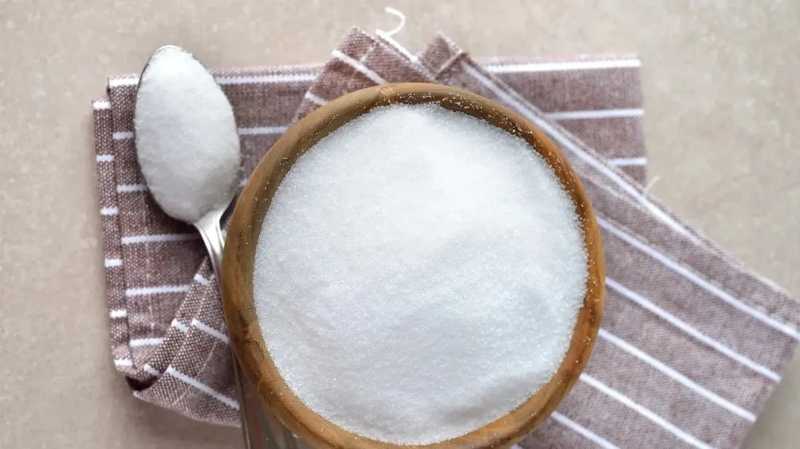Views: 222 Author: Sara Publish Time: 2025-11-17 Origin: Site








Content Menu
● Production pathways and process overview
● Chemical and physical characteristics
● Nutritional and metabolic implications
● Safety and regulatory status
● Comparisons with other sweeteners
● Applications across industries
● Healthcare and dietary supplements
● Consumer trends and market considerations
● Manufacturing and supply chain insights
● Quality assurance and product development practices
● Practical tips for formulating with erythritol
● Regulatory and labeling considerations for exporters
● Global market readiness and supplier collaboration
● FAQ
>> 1. What is erythritol and how is it produced?
>> 2. Is erythritol safe for all consumers?
>> 3. Can erythritol replace sugar in all recipes?
>> 4. Does erythritol cause digestive issues?
>> 5. How should I label products containing erythritol for international markets?
Erythritol is a natural sugar alcohol that has gained wide adoption in the food, beverage, and healthcare industries. Its near-zero calories, low impact on blood glucose, and tooth-friendly properties make it a versatile ingredient for manufacturers and brands focused on healthier formulations. This article delves into what erythritol is, how it is produced, its safety profile, its applications across sectors, and practical guidance for using erythritol in product development, including considerations for international markets and OEM/ODM partnerships.

Erythritol is a polyol, a type of sugar alcohol that occurs naturally in some fruits and fermented foods. Commercial erythritol is typically produced via fermentation of glucose derived from plant starches, most commonly cornstarch, using specialized microorganisms. The resulting erythritol is purified into a crystalline white powder that resembles table sugar in appearance and taste but offers a markedly different metabolic footprint. The compound's unique structure and fermentation-derived origin underpin its safety and functional advantages in many formulations.
Erythritol production relies on a fermentation-based route, followed by extraction and purification steps. The process generally begins with enzymatic or acid hydrolysis of plant starches to generate glucose. This glucose is then fed to osmophilic or specialized yeast cultures that convert it into erythritol. After fermentation, the broth undergoes solid-liquid separation, filtration, and purification to isolate erythritol in crystalline form. Depending on the setup, some producers use continuous fermentation with multi-stage seed tanks to optimize yield, followed by downstream processing to achieve high purity and particle size control. The fermentation step is particularly critical, as strain selection and process conditions (pH, temperature, osmotic pressure) directly influence productivity and cost. Purification steps are designed to remove color and impurities, delivering a product suitable for direct use in foods, beverages, and dietary supplements. Modern advancements also explore optimized strains and feedstock flexibility to improve efficiency and sustainability in erythritol production.
Erythritol is a four-carbon sugar alcohol with the chemical formula C4H10O4. It is a crystallizable solid that is odorless and has a clean, sweet taste profile with about 60–70% of the sweetness of sucrose. It is virtually calorie-free and does not raise blood glucose or insulin levels, which makes it attractive for diabetic-friendly and low-carb product formulations. Its large molecular structure contributes to its high digestive tolerance compared with some other polyols, allowing for distinctive sensory and textural attributes in finished products.
One of erythritol's most notable attributes is its negligible caloric contribution. It is absorbed efficiently in the small intestine and excreted largely unchanged in urine, minimizing impacts on glycemic response. For people managing caloric intake or carbohydrate consumption, erythritol offers a practical sweetening option that preserves taste without compromising blood sugar control. Because erythritol is not metabolized by oral bacteria, it does not contribute to tooth decay, enhancing its appeal in sugar-free gum and oral care products. These metabolic and dental properties collectively support its use in a wide range of health-oriented products.

Erythritol has a long history of safe use and is recognized by major food safety authorities around the world. Most regulatory bodies consider erythritol to be safe for consumption at approved levels, and many jurisdictions classify it as GRAS or equivalent when used within established guidelines. The safety profile is reinforced by extensive toxicological data demonstrating low systemic toxicity, minimal effect on blood glucose, and favorable digestive tolerability in most consumers. As with any sweetener, sensitivity can vary; some individuals may experience digestive discomfort at high intake levels, though erythritol generally exhibits better tolerance than some other sugar alcohols. When formulating products intended for global distribution, it is prudent to follow local regulatory limits and labeling requirements and to provide clear usage guidance for manufacturers and consumers.
Erythritol sits in a family of sugar substitutes that includes xylitol, sorbitol, maltitol, stevia, monk fruit extract, and synthetic sweeteners like sucralose. Its distinct advantages include near-zero calories, zero glycemic impact, tooth-friendly properties, and high digestive tolerance relative to many other polyols. While it shares some functional roles with other sugar alcohols in baked goods and confectionery, its clean flavor profile and crystallinity often translate into favorable performance in products aiming for clean-label positioning. Understanding the relative sweetness, caloric content, and functional behavior of erythritol versus other sweeteners helps formulators design balanced systems that meet taste, texture, and health objectives.
- Beverages: Diet sodas, flavored waters, and energy drinks can incorporate erythritol to achieve sugar-like sweetness without calories. The low glycemic impact makes it suitable for brands targeting diabetes-conscious consumers and low-carbohydrate programs.
- Baked goods and snacks: Cookies, cakes, pastries, and snack bars benefit from erythritol's sweetness and cool mouthfeel. Its crystal form can help achieve sugar-like texture and mouthfeel while reducing overall sugar content.
- Confectionery: Sugar-free candies and gums rely on erythritol for sweetness without tooth decay risk, providing a favorable consumer experience in dental-health marketing narratives.
- Dairy and frozen desserts: Ice creams and frozen desserts can use erythritol to replace part of the sugar, supporting lower calorie profiles while maintaining scooping characteristics and texture.
- Blended sweeteners: Erythritol is often blended with other high-intensity sweeteners (such as stevia or monk fruit extract) to achieve a more sugar-like sweetness curve, reduce aftertaste, and tailor flavor profiles to regional preferences.
- Functional polyols: In some formulations, erythritol can serve as a carrier or co-solvent, aiding texture, crystallization, and mouthfeel in multi-ingredient systems.
- Nutritional supplement powders: Erythritol can be used to improve palatability while avoiding calories, making it suitable for meal-replacement products and diet-focused supplements.
- Medical nutrition and diabetes-friendly products: For patients requiring strict glycemic management, erythritol offers a reliable sweetness option with minimal metabolic disturbance.
- Oral care products: Due to its non-cariogenic nature, erythritol features in dental care formulations and sugar-free gum.
Industrial and OEM/ODM considerations
- Ingredient sourcing and supply stability: For overseas manufacturers, secure, scalable sources of erythritol are essential to ensure consistent product quality and supply chain resilience.
- Formulation compatibility: Erythritol's crystallinity and sweetness profile should be tested within the target product matrix, as interactions with flavors, colors, and active ingredients can influence sensory outcomes.
- Processing and manufacturing: Erythritol works well in many conventional manufacturing processes, including granulation, extrusion, and tablet compression, though optimization may be required for specific blends or high-load applications.
- Labeling and regulatory compliance: Clear labeling and accurate declarations regarding calorie content, sugar alcohols, and any regional labeling requirements help maintain regulatory compliance and consumer trust.
- Clean-label movement: Consumers increasingly prefer simple ingredient lists and natural-sounding sweeteners; erythritol's natural fermentation origin aligns with this trend while delivering functional performance.
- Diabetes and weight management focus: The diabetes-friendly and weight-conscious consumer segments drive demand for erythritol-containing products that still deliver taste and satisfaction.
- Dental health emphasis: Marketing that highlights non-cariogenic properties can support product positioning in candies, chewing gums, and oral care products.
- Fermentation-based production requires careful strain selection, feedstock management, and downstream purification to ensure purity and particle size control.
- Continuous fermentation approaches can improve throughput but demand robust contamination control and process optimization to sustain high yields.
- Purification steps are critical to achieve consistent quality, color, and purity, influencing the overall sensory quality of the final product.
- Specification setting: Define particle size distribution, moisture content, ash content, and purity to ensure consistency across batches.
- Sensory testing: Regular taste panels and consumer testing help refine sweetness intensity and mouthfeel in different product matrices.
- Stability testing: Evaluate compatibility with flavors, colors, fats, acids, and savory ingredients to prevent recrystallization or bitterness over shelf life.
- Regulatory documentation: Maintain robust documentation for audit readiness, including supplier certificates, COAs, and regional regulatory classifications.
- Use blends to balance sweetness and aftertaste: Combining erythritol with another high-intensity sweetener can yield a taste profile that more closely mimics sugar while reducing the overall intensity of any aftertaste.
- Optimize texture and mouthfeel: Erythritol's crystalline texture can contribute to body and bite in baked goods and confectionery, but formulation adjustments may be required to prevent gritty mouthfeel in some applications.
- Manage aftertaste and aroma: While erythritol generally has a clean profile, some formulations may benefit from flavor masking or pairing with pleasant flavors to enhance perceived sweetness.
- Consider cooling effects: Erythritol can impart a mild cooling sensation; this effect may be desirable in mentholated products or beverages but should be considered in sensitive flavor profiles.
- Global markets: Erythritol is widely accepted as a food ingredient; however, labeling requirements differ by country. Ensure compliance with local food labeling laws, including allergen declarations where applicable and clear sugar alcohol disclosures.
- Product claims: When communicating health or dietary benefits, rely on regulatory-approved statements and avoid unverified health claims.
- Export documentation: Provide COAs, certificates of analysis, and traceability data for each batch to support regulatory review and customer audits.
For overseas manufacturers, collaboration with reputable erythritol suppliers is essential to ensure consistent quality, favorable pricing, and reliable delivery timelines. Establish clear communication channels for spec requirements, packaging options, and quality assurance processes. A strong supplier relationship supports product development, formulation optimization, and regulatory compliance across international markets.
Erythritol stands out as a highly versatile, safe, and consumer-friendly sugar substitute that supports healthier formulation strategies without sacrificing taste or texture. Its compatibility with a wide range of products, favorable metabolic profile, and robust regulatory acceptance position erythritol as a cornerstone ingredient for modern food, beverage, and healthcare applications. For manufacturers seeking to serve global markets, erythritol's value proposition is reinforced by strong supply chains, adaptable formulation strategies, and market-ready positioning that aligns with clean-label and health-conscious consumer trends.

Erythritol is a four-carbon sugar alcohol produced primarily through the fermentation of glucose derived from plant starches, followed by purification to obtain crystalline powder. This fermentation-based process yields a near-calorie-free sweetener with a sugar-like taste.
Yes, erythritol is widely regarded as safe by major global authorities and is suitable for most people, including those managing diabetes or following low-carb diets; however, individuals with sensitivities should monitor intake and consult healthcare professionals as needed.
Erythritol can replace part or all of the sugar in many recipes, but its sweetness level and crystalline texture differ from sugar. It may require formulation adjustments or blending with other sweeteners to achieve desired taste and mouthfeel.
Some individuals may experience mild digestive effects at high intakes, but erythritol generally has better tolerability than other sugar alcohols. Start with moderate amounts and monitor consumer responses in new products.
Labeling should reflect the presence of sugar alcohols and any applicable nutritional information, complying with local regulations. Provide clear usage directions and any relevant allergen or dietary notes as required by the target market.
[1](https://www.fine-mill.com/info/detailed-description-of-the-production-method-102837261.html)
[2](https://en.wikipedia.org/wiki/Erythritol)
[3](https://patents.google.com/patent/CN110564782A/en)
[4](https://elchemy.com/blogs/chemical-market/what-is-erythritol-made-from-a-look-at-its-sources-and-production-process)
[5](https://pmc.ncbi.nlm.nih.gov/articles/PMC5434377/)
[6](https://www.frontierspartnerships.org/journals/acta-biochimica-polonica/articles/10.3389/abp.2024.14000/full)
[7](https://pubs.acs.org/doi/10.1021/acsomega.9b04046)
[8](https://www.sciencedirect.com/science/article/pii/S0959652620305801)
